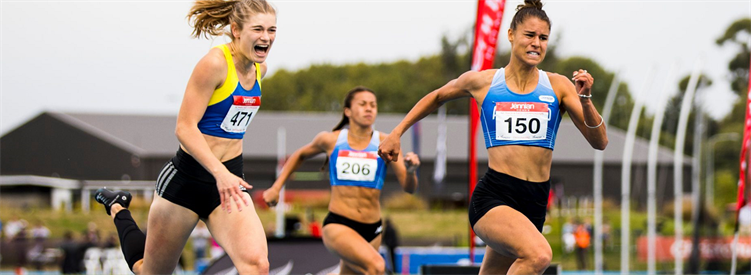News & Updates
Rocket Rosie’s Dramatic Rise

Rosie Elliott has been one of the breakout stars of the 2019-20 domestic season. Steve Landells chats to the Otago-based sprinter about her meteoric progression.
It may be a slight exaggeration to say that Rosie Elliott has emerged from nowhere to the top echelon of women’s sprinting in New Zealand this season. Yet few could have predicted the staggering progress the Dunedin-based speedster has made, after three full seasons away from the sport to elevate herself to the number two 100m and 200m female sprinter in the land.
Running in her trademark long socks, “Rocket” Rosie first served notice of her huge progress by blasting to a 100m lifetime best of 11.68 in her adopted home city back in October. Since that race, she has performed consistently, climaxing with a pair of silver medals in the 100m and 200m at the Jennian Homes New Zealand Track & Field Championships.
Born and raised in Christchurch, Rosie had experienced a stop-start athletics journey. As a primary school student she initially struggled and lacked motivation to run cross country.
“My parents told me if I didn’t start trying harder they would stop watching me,” she says.
A active child, she played a multitude of sports including basketball, touch, rugby, cricket and hockey, but after competing at her school athletics day “around the age of 12 or 13” she was encouraged to join the local Phoenix Athletics Club, although Rosie insists she was initially no world-beater.
“I was not very good,” she admits. “It was only at the age of 14, after going through a growth spurt and becoming a bit more co-ordinated did it start to come together. I improved my 100m time by about a second in one season, which was insane. I suddenly went from competing in C and D races to the A race.”
The Rangi Ruru Girls High School student, slowly started to make her mark and in 2014 enjoyed her best season to date. Despite being based in Christchurch, and having limited opportunities to train or compete on a synthetic track – following the closure of the Queen Elizabeth 2 Stadium, under the guidance of her then coach, Jonathan Black, she consistently performed around 12.8/12.9 for the 100m.
However, in her final race of the 2014 domestic campaign, she blasted to a stunning new PB of 12.39, to strike 100m gold at the South Island Championships in Timaru – a performance which helped kick open the door for selection to compete at the Oceania Junior Championships in Rarotonga.
“That performance in Timaru was one of the highlights of my high school running career,” she explains. “It was pretty amazing.”
In Rarotonga she competed in the 4x100m relay, 100m and high jump and enjoyed a fantastic experience in the Cook Islands. However, on her return back to New Zealand and struggling with a back and foot injury her passion for the sport started to wane.
“I reached a bit of a bump in the road where I’d achieved my goal of representing my country, but the other age-group international competitions seemed quite unattainable, so I lost motivation,” she explains.
She carried on competing through the 2014/15 campaign, winning a pair of bronze medals in the U20 women’s 200m and high jump at the 2015 National Championships, but from that point on until the end of 2018 she walked away from the competitive side of the sport.
During her time away, Rosie enjoyed a gap year and took some time out travelling in Europe. She started life at the University of Otago, took up rugby, but picked up a nasty concussion which sidelined her for a lengthy period and she also underwent a period of mental health challenges.
Keen for greater equilibrium in her life, in late-2018 she re-started training with Jonathan Black in Christchurch once more. After several months of training, Jonathan recommended that on her return to Dunedin for the new university year she connect with Brent Ward, coach of Paralympic long jump champion Anna Grimaldi. Rosie heeded Jonathan’s advice and it has not been a decision she has regretted.
Starting out training five days a week, which later stepped up to six days, the Anatomy and Microbiology student took time to transition, but over time she adjusted to the training demands and in late-winter she also fixed a long-term issue with her stomach.
“I saw a nutritionist who adjusted my diet to make sure I was getting all the right macro and micronutrients in my diet,” she explains. “The big thing was increasing the amount of protein I was consuming, which helped give me the right amount of energy to sustain my training. Just learning to manage what I can and can’t eat was incredibly helpful. I felt it has made a big difference.”
After opening her season with a 100m PB of 12.07 in October in Dunedin just one week later she dismantled that mark with an 11.68 clocking at the Caledonian Ground. It was an enormous progression which left Rosie feeling elated.
“My training partners said I was in sub-12 second form but to run 11.68 in awesome conditions was amazing.”
For some time she worried the performance was a fluke. She became temporarily distracted from her studies, but over time she has adapted to her new found status. Consistency has not been an issue for the long-striding sprinter. She finished in the top three at the Potts Classic, Capital Classic and Porritt Classic in the 100m – regular clocking legal times in the 11.7-11.8 range.
However, the 22 year old has, arguably, been even more impressive in the 200m. Setting a lifetime best of 23.59 in December, (a performance which elevated her to 11th on the all-time NZ lists) and earning the scalp of national 200m champion Zoe Hobbs, at the Sir Graeme Douglas International in Auckland, added to her growing reputation within the New Zealand athletics community. Describing the past few months as “a whirlwind”, she nonetheless went into the New Zealand Track & Field Championships in good heart.
“I tried not to put too much pressure on myself,” explains Rosie. “I was aware I had the potential to do well, but Christchurch is so changeable with the wind and the weather, I didn’t want to add too much expectation.”
In the 100m, Rosie produced an outstanding performance to win silver, behind defending champion Zoe Hobbs, in a new PB of 11.66. The South Islander describes claiming silver as a relief, especially after she was spared a disqualification from officials after false-starting.
“It was amazing the officials let me race, because I thought, I’d blown it,” she explains. “It was such a relief to get to the finishing line knowing I’d run a strong race into a nice legal wind (of +1.3m.s).”
Her 100m performance provided a confidence boost ahead of the 200m, where the pre-race plan was to run as strongly as possible around the bend, before focusing on catching Zoe Hobbs down the home straight – a plan which was almost executed to perfection, as she finished just 0.01 behind the gold medallist, in a wind-aided 23.27.
“I’m painfully aware my bend running is quite average,” she explains. “Zoe has an insanely amazing start and she caught me on my inside after just 30m. I just had to try and run her down, which I nearly did. It was a close one, but I can’t complain, I have to be happy with how the season has gone, it has been fantastic. I’ve had some amazing races, no injuries and I have plenty of motivation for next season.”
Praising the huge role Brent has played in her development she hopes to continue to improve, particularly on the technical aspects of her race and her bend running.
So what are Rosie’s aims and ambitions for the future?
“The 2021 World University Games would be nice, but I haven’t given it too much thought,” she explains. “I’m just aiming to get stronger and faster over the winter and to put in a really good base.”
